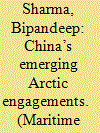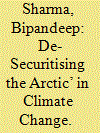| Srl | Item |
| 1 |
ID:
181698


|
|
|
|
|
| Summary/Abstract |
Climate induced geo-physical transformations occurring in the Arctic are also attributing to geopolitical transformations of the region. Opening up of the Arctic is resulting in a geopolitical race amongst the Arctic and non-Arctic states to dominate emerging economic and strategic opportunities in the region. Transformations in the Arctic assume global links and possess a potential of significantly impacting the Arctic as well as the Asian states. China’s assertiveness to become a Polar Great Power has set a course for new Asian perceptions towards the region. In pursuits of its economic, environmental, scientific, social and strategic endeavours, China is making significant inroads in the region to meet its short and long-term objectives. This paper makes an attempt to reconsider India’s approach towards the Arctic not by taking China as a benchmark, but rather as a useful backdrop to broaden and deepen India’s engagements in the circumpolar north.
|
|
|
|
|
|
|
|
|
|
|
|
|
|
|
|
| 2 |
ID:
182611


|
|
|
|
|
| Summary/Abstract |
The rapidly transforming Arctic has led to rethink the concept of security in the region. The increasing global warming and opening up of the Arctic have brought multiple geopolitical issues before the Arctic and non-Arctic states.1 In pursuit of their perceived geopolitical, geo-economics and strategic interests, a race to ‘securitise the Arctic’ has started amongst the major Arctic states. This process of securitisation appears to be dictated and driven not only by traditional military-strategic considerations but also by non-traditional security threat dilemmas related to energy, environment, sustainability, human security, connectivity, etc. As the old and the new Arctic challenges are being taken out of the realm of ‘normal politics’ and placed in the contested domain of ‘security politics’, the Asian states, that are directly or indirectly impacted by the changing Arctic realise that securitisation of the Arctic is leaving little space for addressing common issues of global concern. This study argues that all these emerging issues (otherwise perceived as ‘security threats’) in the Arctic, instead of being addressed in the securitisation framework, could and should be approached and addressed as compelling reasons for mutual cooperation and thus in need of de-securitisation.
|
|
|
|
|
|
|
|
|
|
|
|
|
|
|
|